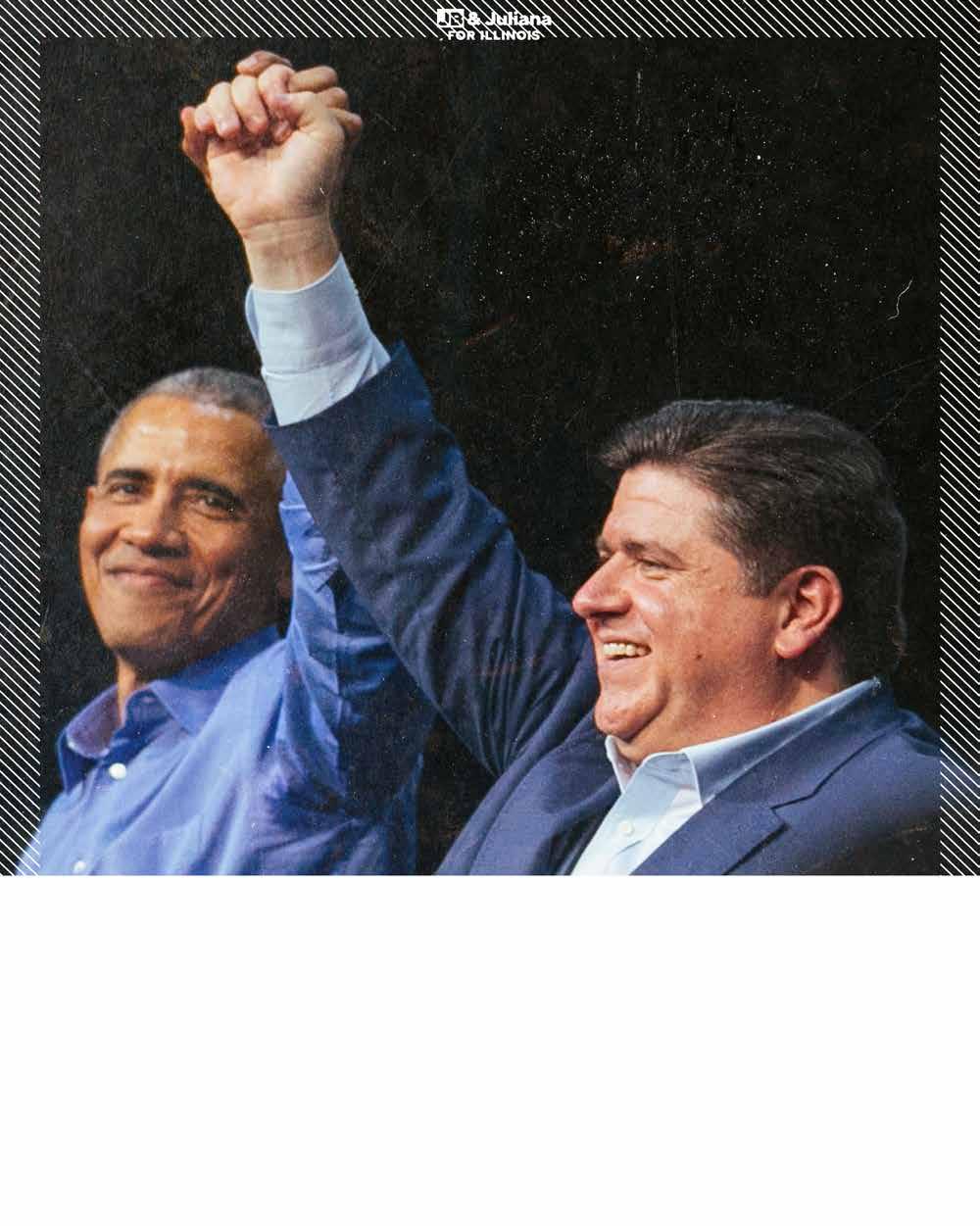



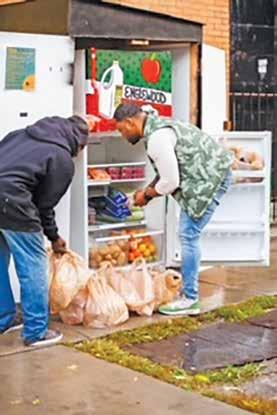








CHICAGO — State Rep. Lakesia Collins, D-Chicago, is encouraging those with federal student loan debt to apply for one-time federal student loan debt relief.
“Student loan debt significantly impacts a person’s ability to pay for rent, food or utilities, let alone build enough wealth to support their families or weather emergencies. Student debt also feeds into the racial wealth divide, with black borrowers carrying more debt than their white counterparts,” Collins said. “The federal student loan debt relief plan is a fantastic start at remedying these issues. Debt relief will allow borrowers to more fully participate in the economy and build credit, leading to more opportunity overall. I highly encourage everyone who qualifies to apply for federal student loan forgiveness.”
Under the federal student loan debt relief plan, the U.S. Department of Education will provide up to $20,000 in debt relief to Federal Pell Grant recipients and up to $10,000 in debt relief to non-Pell Grant recipients. Borrowers are eligible for this relief if their individual income is less than $125,000 or $250,000 for households. To apply for student loan debt relief, please visit https://studentaid.gov/debt-relief-announcement/ one-time-cancellation. Applications are due Dec. 31, 2023.
CHICAGO – ComEd announced that subscribers to three community solar projects designed for income-eligible customers are now receiving credits that will provide approximately $1,000 a year in savings on their electricity bills for up to three years.
The projects – one in Rockford, Ill., and two in Kankakee, Ill. – were developed in con junction with ComEd’s Give-A-Ray program, a new offering enabled by Illinois Solar for All, a state initiative to make solar energy more afford able for income-eligible households. Community solar allows customers to participate in the benefits of clean solar energy without installing panels on their own homes. Participants sub scribe to a solar energy project and earn credits on their monthly utility bills for their portion of the energy produced by the solar project.
Give-A-Ray is the first program of its kind in Illinois. The three projects serve a total of more than 560 customers, and ComEd pays their monthly subscription fees. Subscribers to the Rockford project started receiving monthly bill credits averaging $83 in August, and Kankakee participants began receiving credits in October. Give-A-Ray projects are open to income-eligible residents with an active ComEd account who live in the communities ComEd serves. While the three projects are currently fully subscribed, customers can learn more about the program requirements and register their interest for future openings at: www.ComEd.com/GiveARay.
By the end of this year, ComEd expects to have more than 80 community solar projects in terconnected to its grid and serving approximate ly 30,000 residential customers. The company estimates that it will increase solar generation on the ComEd system from a current level of almost 500 MW to 2,700 MWs by 2030, including roof top and community solar systems. The number of residential and business customers who have installed solar systems has grown from 700 at the end of 2016 to almost 30,000 at the end of June 2022.
from page 1
BY TIA CAROL JONESHe wanted to do something new and different, and providing fresh produce to the people in the Chicagoland area was some thing he wanted to take on, because of his own experiences with food insecurity.
Citizen Newspaper: Why is ending food insecurity some thing you wanted to take on?
Dion Dawson: Food insecurity is something that I took on because when we look at the critical needs, we have food, shelter, and clothing. It’s something that has plagued me throughout my life and it’s something that everybody needs. It’s something that universally binds all of us together. We all need food to live and we want fresh food, because that gives us a better chance at living a long life. So, you know, when it came to food, it was something that I felt, I’ve been hungry I’ve been food insecure. it’s some thing that I can relate to.
CN: In September, you reached a new milestone. Would you share that with us?
Dawson: September was important for us because we eclipsed 200,000 pounds of fresh produce to Chicagoland resi dents. I think that is a testament to not only what we’ve been able to build, but that not a lot of organizations get to that milestone of 200,000 pounds of fresh produce, provided to the community, let alone, it being all purchased and not donated food.
CN: Where does Dion’s Chicago Dream deliver fresh fruits and vegetables?
Dawson: We’re tackling food insecurity all throughout the Chicagoland area. We’re delivering in more than 23 Chicagoland neighborhoods at about a 45-mile radius. We’re at more than 2300 residents per week, at almost 400 homes per week and about 15,000 pounds per month. That is why what we’re doing is so revolutionary because food insecurity is not a black or white issue. Food insecurity is a human rights issue, that we’re focused on getting to the root of and making sure that everybody has the best
possible chance at access to fresh produce.
CN: How important is it for you to have partners and sup porters as you do this work?
Dawson: Partners and supporters are crucial to the survival of Dion’s Chicago Dream. Supporters, they’re everything. We call our network The Dream Team. When it comes to those sup porters, those donations mean the world to us because it allows us to continue to fight food insecurity our way. Every $20 is a week’s worth of brand-new fresh produce that we can provide to a household for that week. Every $1,000 provides a household with fresh produce with Dream deliveries for the year. We’re accountable to our supporters. We’re accountable to the public, we’re accountable to our residents, because that’s what this is all about.
CN: You recently began a partnership with the American Diabetes Association. What are some of the ways this part nership benefits the community, and specifically people with Diabetes?
Dawson: This partnership with the American Diabetes Association allows us to really focus on scaling this model that we’ve created. We’re doing everything we can to affect the social determinants of health. We know that a vast majority of people who have diabetes or are predisposed to diabetic condi tions, that their diet and what they have access to plays a major role in that. It allows us to really start building out a continuity of care that will be unmatched just in terms of food distribution and consistency.
CN: How can people support the work you do?
Dawson: To support Dion’s Chicago Dream, we encour age everybody if they can, to consider donating to our website, www.DionsChicagoDream.com. There, you can become a reoccurring donor at whatever level you can afford. You can also follow us on every social media platform. @DionsChica goDream. We’re on Tik Tok, Twitter, Instagram, Facebook and LinkedIn.
Mountain bike riders and trail runners have a new single track trail system among woodlands, grasslands and wetlands in the Paul Douglas Forest Preserve. A ribbon-cutting celebration at the Forest Preserves of Cook County’s property in Hoffman Estates was led this morning by Cook County Board and Forest Preserves President Toni Preckwinkle, Cook County Commis sioner Kevin Morrison, Forest Preserves General Superinten dent Arnold Randall, Chicago Area Mountain Bikers (CAM Br) Executive Director Mike Angus and other local elected officials and community members.
The Paul Douglas trails follow from the success of the popular Palos Preserves single track trails in Southwest Cook County, a long-standing partnership between the Forest Pre serves of Cook County and CAMBr. The Paul Douglas system offers 13.3 miles of single track trails—narrower, natural surface trails that are designed to challenge mountain bikers and trail runners.
“For years, the extensive single track trail system in our Palos Preserves has been the premier mountain biking experience in Cook County. Now Paul Douglas Preserve is the newest destination for riders, runners and anyone looking for a more immersive natural experience in Northwest Suburban Cook County,” President Preckwinkle said.
A total of 13.3 miles of single track trails are now open in Paul Douglas Preserve. The west side of the preserve has
8 miles of trails, including a 4.5-mile route and several loops ranging from 1 to 3 miles. Another 5.3 miles are open on the east side, which will be expanded to a total of 9 miles when fully complete. Runners and riders move in opposite direc tions, switching by days of the week—making it safer on the trails and essentially doubling the experience for repeat visits.
Five years ago, CAMBr began working with the Forest Preserves to identify a site to add a set of single track trails in the north half of Cook County. Working together, the Pre serves and CAMBr identified the best routes that balance the riding experience with protecting against erosion and mini mizing the impact on the local ecology and wildlife. The trails themselves have been built with more than 3,000 hours of volunteer time by nearly 150 CAMBr members.
At 1,800 acres, Paul Douglas Preserve is one of the largest contiguous parcels of land anywhere in the Forest Pre serves, with a mix of woodlands, prairie, marshes and ponds. Ecological restoration at the site by the Forest Preserves has included improvements to the water flow and removing hedge rows, which has led to healthier wetlands and the return of nesting grassland birds like savannah sparrows and bobolinks.
Other speakers at the ribbon-cutting included Village of Hoffman Estates Trustee Gary Pilafas and Wayne Haworth, who coordinates the Trailhead run group for Dick Pond Ath letics.
Over the last few years everyday people, along with the news media, have worn bare the phrase “voter apathy.” It has remained part of the English lexicon be cause it is a handy way to describe low voter turnout, as well as pundits being wrong with their predictions about certain races of candidates.

The phrase was fueled by the reality that we could look at the pathetically low voter participation in certain parts of the city.
Political forecasters offered a bevy of reasons for folks staying home; however, they repeatedly failed to bring up one we know is true. Let’s call it candidate apathy.
One need not be a political science graduate to understand the basic premise of the process, candidates promise a certain improvement, or introduction to a partic ular program to a community in exchange for their vote. It is a tit-for-tat as old as elections. We have been led to believe that
voter apathy is at the root of our government problems; after all, the people we do vote for wind up in office running the govern ment
The harsh reality is that candidate apa thy is far worse than indifference by voters.
Far too many candidates, representing both sides of the aisle, refuse to give so many in our community anything other than short shrift. Oh sure, they all make their rounds to Black churches on Sundays lead ing up to the election. If you are Black, ask yourself how many other times do you see them hanging out in our parts of town.
Ask yourself that when there are at least 500,000 Black people on the South Side, why do candidates only go to two or three churches, and believe they are reach ing those tens of thousands of voters. It has morphed into some kind of show, especially on the local level, with a candidate rushing from church to church on a Sunday.
The premise about reaching most voters at church is a myth. Even cursory research will tell you that there are far more folks at home at 11 a.m. Sundays than are in church.
How often do we see candidates for public office at a local school council meet ing, or a high school basketball game?
One of the most egregious facts is they spend tens of thousands of dollars on tele vision commercials that put people to sleep, but they refuse to infuse significant dollars in the Black media outlets. The advertising buys they place with us can only be de



scribed as pathetic. In most instances those ads are crafted by no one who is rooted in or deeply familiar with our community.
We have credibility with our readers because we know how to speak to them. Too many times when state candidates or those running for Congress do advertise with us, they are using the same wording that they would for an ad running in Ke nilworth.

We don’t bend over backward, like one daily newspaper, to focus on crime and the negative aspects of our community. We also have a loyal readership. To date, no one has ever explained to me why white media outlets should have campaign ads, and Black outlets shouldn’t. If that isn’t the case, the folks running for office sure make it seem that way.
It is not unusual for our audience to reach out to us seeking our opinions on particular candidates and incumbents. When the candidates, as well as incumbents, refuse to meet with our editorial boards or partic ipate in one-on-one interviews, it makes it tough to give an informed perspective.
Conversely, they have no problem having one of their minions call our respec tive outlets asking for an endorsement. It is the height of hypocrisy. You won’t give us your money by advertising but you want the credibility and cache that comes with our name via an endorsement. I don’t know how candidates and incumbents can be any more apathetic.
CHICAGO, Ill. -- 3Arts, the Chica go-based nonprofit grantmaking organiza tion, honors the milestone 15th anniversary of the 3Arts Awards with nearly half a million dollars in unrestricted grants to Chicago artists. The 15th annual 3Arts Awards Celebration takes place Monday, November 7 via livestream on YouTube where the organization will honor ten new 3Arts Awards recipients with $30,000 cash grants, announce $50,000 Next Level/Spare Room awardees, and award ten additional artists with $2,000 cash grants through Make a Wave. The online event is free to the public and features commissioned perfor mances by 3Arts artists, including Aram Han Sifuentes, Bethany Thomas, Robby Lee Williams, and Santiago X. Registration is required at https://3arts.org/event/.
In its 15-year history, 3Arts has supported more than 1,800 artists across all program areas, representing approximately 70% women artists, 70% artists of color, and 20% Deaf and disabled artists working in the six-county metropolitan area, and distributed $5.8 million in direct grants. Through cash awards, project funding, residency fellowships, professional devel opment, and promotion, 3Arts cultivates and sustains the vibrancy of Chicago’s art community by allowing artists to take risks, experiment, and build momentum in their careers.
The 2022 recipients of 3Arts Awards are:
Dance artists Winifred Haun and Sarita Smith Childs; musicians Akenya and Nashon Holloway; teaching artists Pere grine Bermas and Simone Reynolds; theater artists Miranda Gonzalez and Omar Abbas Salem; and visual artists Rozalinda Borcilă and zakkiyyah najeebah dumas-o’neal.
3Arts will additionally celebrate the recipients of Make a Wave, a groundbreak ing artist-to-artist grant program in which past 3Arts Awards recipients select another ten Chicago artists to receive surprise cash awards, sending a “wave” of support through Chicago’s cultural communities. Make a Wave artists receive $2,000 per artist, thanks to the generous partnership of the Siragusa Family Foundation. The 2022 recipients of Make A Wave grants are Zahra Glenda Baker (vocalist, storyteller, and teaching artist); Maggie Brown (vocalist and teaching artist); Stephanie “Stef Skills” Garland (street art muralist and educator); Leah Ra’Chel Gipson (interdisciplinary artist and scholar); Terry Guest (playwright, actor, and director); Malik Johnson aka 99TheProducer (cellist, composer, and pro ducer); Ivan Lozano (visual artist and pod caster); Elisabeth YJ Seonwoo aka Kerberus (dancer); Andrea Yarbrough (maker, curator, and educator); and Wai Yim (actor, director, choreographer, and playwright).
Chicago’s Environmental Protection Agency (EPA) workers, represented by the American Fed eration of Government Employees (AFGE) Local 704, have filed suit against the EPA in the United States District Court for the District of Columbia, seeking disclosure of documents under the Freedom of Information Act (FOIA) regarding the agency’s implementation of remote work for Region 5 EPA employees.
EPA state offices are divided into ten regions nationally. Region 5–which is the largest–approves remote work policy for EPA workers in Illinois, Indiana, Michigan, Minnesota, Ohio, Wisconsin. The union said EPA employees in Region 5 have been facing a much higher percentage of denials for remote work than most other EPA employees nation ally. But when the union has sought data from EPA management to understand Agency decision-making, the union has been met with silence.
Since the COVID-19 pandemic began, many federal employees have been granted the ability to work remotely to protect their health and the health of their families and communities. EPA employees were praised by EPA management, even under the Trump administration, for their effectiveness work ing remotely--processing more environmental permit applications during the first year of the pandemic compared to a standard year working in-person. While lab testing may require in-person work, many positions at EPA are not dependent on working in person at the Region 5 headquarters, at 77 W. Jack son in downtown Chicago and other satellite offices.
“Unfortunately, during the last year, Region 5 employees have faced unfair denials of their requests for remote work compared to what we are seeing nationwide,” said Nicole Cantello, President of AFGE Local 704 which represents EPA employees in Region 5. “To try to get some clarity on the issue, we submitted FOIA requests in May 2022, to get more information about internal remote work discus sions, specific denials of remote work for Region 5 employees, and remote work that had been approved for other similarly situated EPA workers. We have not received the data we need and to which we are entitled. EPA’s ‘estimated date of completion’ of the most crucial FOIA requests is months away.”
“Other EPA offices across the country have not been denying remote work requests like we’ve been seeing here in the Midwest,” said Cantello. “The union originally bargained the right to remote work with EPA to protect members and their families during this pandemic, so we need to understand why the Region 5 management is denying applications and withholding documents that the union needs to examine EPA decision-making on remote work under FOIA.”
The union is being represented in the lawsuit by Hudson B. Kingston, Litigation and Policy Attorney of Public Employees for Environmental Responsibil ity (PEER.)
“PEER stands poised to help public servants obtain the information they are entitled to receive from their agencies,” said Kingston. “This episode illustrates that EPA is often better at preaching trans parency than practicing it.”

The civil suit with more information about the FOIA request, is available here. (https://mcusercon tent.com/5d5e50872dd1af3b8172cf48b/files/9d 8793fb-1574-1ef0-1d75-5ef9c659c5ae/AFGE_Lo cal_704_v._EPA.pdf)


BRONX, N.Y., PRNewswire -- The Knowledge House (TKH) will continue its eight-year journey with its 2022-23 Fellowship Campaign. This year’s theme is the “Great Restoration” to answer the call to corporations in need of Black and Brown technolo gists through its successful nationwide programming at its satellite locations in New York City, Newark, Atlanta, and Los Angeles.
The Fellowship Campaign allows TKH to mobilize resources, volunteers, mentors, and funders to provide support to the incoming class of 2022-23 fellows. Last year TKH raised $1.2 million, with over half raised with support from our corporate partners at JP Morgan Chase, Citi, and Gold man Sachs. Notable headliners included Asahi Pompey, Global Head of Corporate Engagement and Pres ident of the Goldman Sachs Foundation, and Maurice Jones, Chief Executive Officer at OneTen.
Accenture is hosting a reception to help TKH reach its fundraising goal of $2.5 million to support up to 250 future technologists - TKH is currently just half a million away from reaching its goal this year.
Despite the growth of America’s tech sector, less than 10% of tech positions are held by people of color - a distribution that does not reflect our nation. While the vast majority of DEI-conscious corporate sector leaders have exhausted all traditional avenues to hire more individuals from historically underesti mated communities - it has proven extremely difficu
The Knowledge House provides direct access for corporations to find suitable candidates – a diverse pool of historically underrepresented talent with experience ranging from college stop-out, trade schools, career pivoters, CUNY grads, and more, to entry-level talent who have received holistic training and support, including cash stipends, career develop
ment, technical upskilling, and on-the-job training.
“Candidates are attracted to our program because we provide (1) an inclusive, high-quality, and part-time program that allows Fellows to still work during the day while pursuing their new path, and (2) a stipend to help students make ends meet, instead of charging $20,000 for a traditional coding boot camp. We partner with community-based orga nizations in our site cities to identify underestimated talent looking to transition into the tech industry. Throughout the Fellowship, we provide indus try-relevant career navigation instruction to prepare Fellows to position themselves for strong first tech jobs,” says Daniel Adeyanju, Director of Programs at The Knowledge House.
The Fellow ship Campaign will kick off with The Knowledge House’s Corporate Partners Reception presented by Accenture in New York City on November 15th.
Join The Knowledge House and corporate partners for an innovative reception at Accenture as leaders convene for a solutions-focused panel on finding, retaining, and advancing diverse talent and a fireside chat on the future of technology in NYC! Opening Remarks by Priscila de Pinho (Accenture) and Jerelyn Rodriguez (The Knowledge House). Main Panel moderated by Selena Hill (On-Air Talent/Black Enterprise); with Marcus Felder (Blackstone), Gary Johnson (Cashapp), and Neela Pal (Goldman Sachs), plus Fireside Chat moderat ed by Rah Thomas (Accenture) and Abby Jo Sigal (Executive Director, Mayor’s Office of Talent and Workforce Development).
For tickets and more information: https://www. classy.org/event/the-knowledge-house’s-corpo rate-partners-reception/e420403. To learn more, visit theknowledgehouse.org.

WASHINGTON, PRNewswire -- To advocate for policies that support innovation, equity, and opportunity for all, leading community empowerment advocates and financial services innovators announced the official launch of Fintech Future: Financial Innovation for Equity and Opportunity (“Fintech Future”). Fintech Future supports responsible innovation that breaks down traditional barri ers to wealth creation and bridges the access gap to modern financial services in historically excluded communities. Responsible fintech innovation democratizes finance to create equity and give millions of Americans access to the resources they need to realize their dreams.
Through advocacy, public policy and coalition build ing, Fintech Future will work with community leaders and organizations, government partners, and regulators to support equal access to modern financial services while supporting responsible policies and efforts that ensure the highest levels of compliance, accountability, and consumer protection.
“For far too long the pathways to wealth creation have been closed off to non-white and underserved communi ties. Innovation across the financial services sector has broken down those barriers, offering new opportunities for families and small businesses who were long left out and behind. It is vital that our community of responsible inno vators come together and speak out in support of policies that preserve and protect opportunity for all,” said Tom Soto, a founding member of Fintech Future and Founder/ Managing Partner at Latimer Partners, LLC.
“The rapid innovation in financial services has led to a generational shift in how non-white and low-income communities can access the resources they need to achieve their dreams. Responsible fintechs also stepped-up during times of crises to reach those who needed the help the most and are far too often left behind. Responsible fintechs launched safe and efficient application portals that were available to any eligible small business in need, regardless of whether or not they had a pre- existing relationship with a bank. Two years later, 1 in 4 Black-owned companies applied with fintech lenders to receive the support they needed to get through the crisis. What that tells us is fin tech opened the gates to all, challenged the status quo and overcame the traditional biases and barriers to financial services normally reserved for the few. Fintech Future will advocate for responsible policies that embrace this innova tion and guide its growth so it can deliver for our commu nities across the country,” said Natalie Madeira Cofield, founding member of Fintech Future and Former Assistant Administrator of the U.S. Small Business Administration.
As recently as 2008, when the system failed with the great recession, it was primarily marginalized, middle-class and low-income families, businesses and communities who bore the brunt with foreclosures and layoffs. Coming out of the great recession then and more recently the global pan demic, financial and tech innovators saw an opportunity to disrupt a broken system and build a 21st century financial infrastructure with the mission of democratization, inclu sion and breaking down the barriers that had traditionally ostracized many disenfranchised borrowers.
To learn more, visit www.fintechfuturecoaltion.org or follow us at @fintech_future.
Chicago – Attorney General Kwame Raoul convened a roundtable meeting with representatives of leading abortion access organizations and repre sentatives from top law firms in Illinois to discuss ways to address an anticipated rising need for pro bono legal representation of abortion providers, patients and support groups.
“As states around the country, particularly those surrounding Illinois, ban or severely restrict abortion, we are concerned about other states’ laws instilling fear, curbing access to abortion, and punishing pa tients and providers in Illinois. The legal community must unite to meet these challenges,” Raoul said. “As the legal landscape around abortion changes rapidly, no one should fear legal ramifications for seeking or providing essential health care services in Illinois. I appreciate everyone who participated in this discussion to kick off what I hope will be an on going collaborative effort to protect abortion patients and providers in Illinois.”
During the meeting, reproductive rights orga nizations described the legal issues they have faced following the Supreme Court’s decision to overturn Roe v. Wade and how private law firms could help fulfill needs for pro bono legal representation. These organizations said they anticipate a continued fight against legal issues amid the evolving legal landscape.
Representatives from Illinois law firms pro vided information about their pro bono programs and explained how their firms’ representation have supported reproductive rights.
The U.S. Supreme Court’s decision overturning Roe v. Wade in June has led to at least 13 states ban ning or severely restricting access to abortion, while additional states like Indiana have bans that could go
into effect if challengers lose in court.
While Illinois law protects access to reproduc tive health care as a fundamental right and federal law ensures the constitutional right to interstate travel, states like Texas have passed laws seeking to impede residents’ ability to travel to states like Illinois to obtain an abortion. Providers who perform reproductive health care services in Illinois on out-of-state patients are concerned they could face ruinous civil and criminal liability in other states, whose laws are changing rapidly.
In addition to the financial and logistical hur dles of traveling long distances for abortion care, outof-state patients also fear legal repercussions when they return home to a state that has banned abortion.

Raoul gave an overview of his office’s work to protect abortion access in Illinois and to advocate for access beyond the state’s borders, including by:
Issuing a Know your Rights Guide informing the public that they have a protected right to an abortion in Illinois.
Sending a letter to Illinois law enforcement instructing that abortion is not a crime in Illinois.
Publishing a consumer alert with tips on how individuals can protect their sensitive personal information and digital footprints while using apps and online platforms.
Regularly filing amicus briefs in court in sup port of reproductive rights.
Convening state attorneys general and repre sentatives from the U.S. Department of Justice to learn about enforcement of the federal FACE Act and promoting communication between federal and state law enforcement to protect the safety of those providing and accessing reproductive health services.
Chicago a cappella, Chicago’s acclaimed vocal ensemble, begins its 30th season this December with two new holiday concert programs, “Holidays a cappella” and “Hanukkah a cappella.”
“Holidays a cappella” is an annual tra dition for Chicago a cappella, and every year the ensemble presents a fresh program of cre atively arranged and beautifully performed holiday compositions, including sacred mu sic, holiday classics and lesser-known songs that are exhilarating and memorable.
After singing as an ensemble member with Chicago a cappella for 11 seasons, Benjamin Rivera returns for his third series concert as guest music director for “Holidays a cappella.” This year’s program showcases the ensemble’s beautifully blended voices and mesmerizing harmonies.
“I loved putting together this program, because Chicago a cappella can tackle so many styles and languages,” said Music Director Benjamin Rivera. “I found really captivating works from Germany, France, Puerto Rico, and the U.S., along with a good sampling of songs for Hanukkah and some familiar favorites as well.”
Performances of “Holidays a cappel la” will be held on the following dates and locations:
Sunday, Dec. 4, 2022, at 4 p.m.| Pilgrim Congregational Church, 460 Lake St., Oak Park
Friday, Dec. 9, 2022, at 8 p.m. | Fourth Presbyterian Church, 115 E. Delaware Pl., Chicago
Saturday, Dec. 17, 2022, at 8 p.m.| Wentz Concert Hall, 171 E. Chicago Ave., Naperville
Sunday, Dec. 18, 2022, at 4 p.m. | Nichols Concert Hall, 1490 Chicago Ave., Evanston
“This year we are also presenting a program that really is a unique new offering for Chicago’s holiday season: “Hanukkah a cappella,” said Matt Greenberg, Execu tive Director. “We are delving into the rich heritage of Jewish music for Hanukkah, both traditional and modern, with its humor, expressiveness and eloquence.”
With musical direction by Artistic Di rector John William Trotter, the program will feature stellar works by eight living Jewish composers—from heartfelt prayers to jazzy and playful holiday tunes— showcasing the creativity and vitality of American Jewish music and revealing the multi-layered joy, richness and meaning of this festival.
Artistic Director John William Trotter notes, “It’s a joy to collect so much of the great Hanukkah repertoire the ensemble has performed in years past and present it all together in one concert, along with some great new finds.”
Performances of “Hanukkah a cappel la” will be held on the following dates and locations:
Saturday, Dec. 10, 2022, at 8 p.m.| Congregation Rodfei Zedek, 5200 S. Hyde Park, Chicago
Sunday, Dec. 11, 2022, at 4 p.m. | Congregation Sukkat Shalom, 1001 Cen tral Ave., Wilmette
Memberships and tickets can be pur chased online at www.chicagoacappella. org/tickets. For more information, please visit www.chicagoacappella.org or call (773) 281-7820.
Chicago a cappella presents two stunning holiday concert programs this December: “Holidays a cappella” and “Hanukkah a cappella”



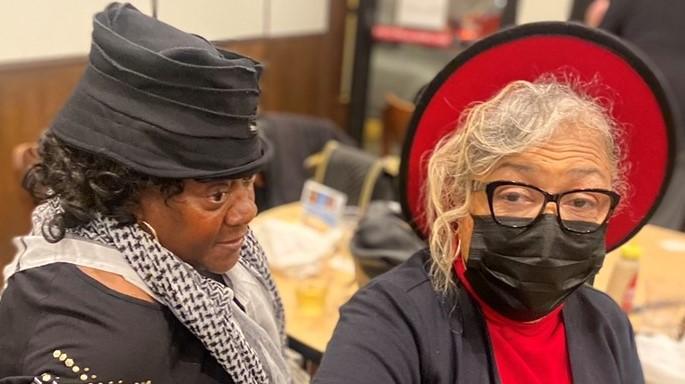

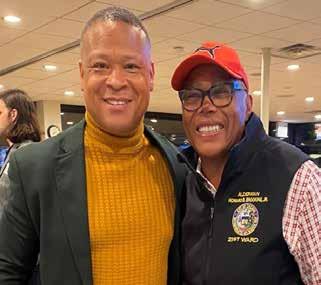
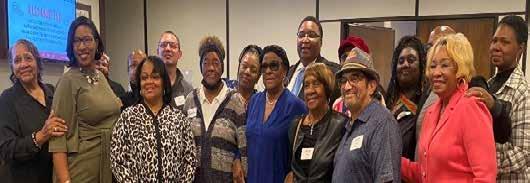


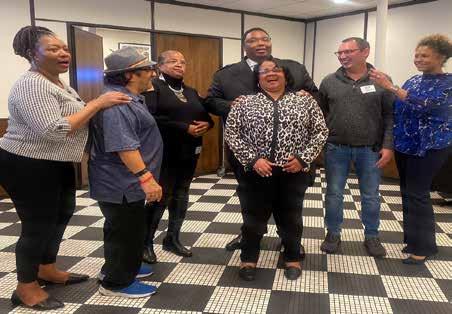
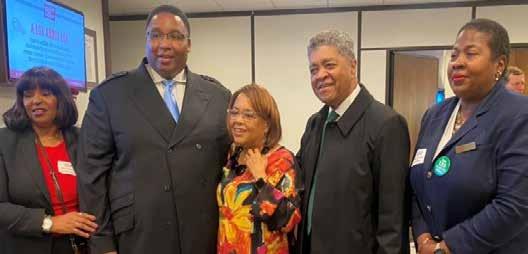




DEERFIELD BEACH, Fla., PRNewswire -- Maverick En tertainment is proud to present, “Boxed In,” a film directed by Ariel Julia Harston and starring Reginae Carter (Lil Wayne’s daughter). The premiere will be held outside of Atlanta on Nov. 3rd, attended by Reginae Carter and the rest of the cast. The movie will be available for streaming on all streaming platforms on Dec. 1st.
View the official trailer here: https://youtu.be/Qj8d
FLYs_2A
The film, produced by J. Carter and LaShon Carter, follows a young woman (Reginae Carter) whose determi nation to find and be her authentic self catapults her into a boxing career that her family does not approve of. The Maverick Original film also stars Clifton Powell, and Lil Zane, among up-and-comers Sean Freeman and Ernestine Johnson.

“This role will be Reginae Carter’s breakout role and will have people seeing her in a brand new light,” said J. Carter.
Director Ariel Julia Harston said, “On the surface, ‘Boxed In’ seems to be about boxing and fighting for the right to express a side of you that people say is wrong. And it is about that, but at its core, it’s about family. There’s a heartwarming element to it that we hope audi ences really enjoy. Because at the end of the day, you may not relate to boxing, but you can relate to how important it is to remain close to the people you love.”
Founded in 1997, Maverick Entertainment continues to be the premier distributor of niche and Urban content. Having released more than 1,000 films over the past 25 years, Maverick currently controls the world’s largest library of feature-length Black Cinema.
In addition to funding and producing originals, Maver ick releases 100+ movies a year and distributes physical ly and digitally worldwide to a growing list of platform partners.
For more information, visit https://www.mavericken tertainment.cc/.
NEW YORK, PRNewswire -- BET+, the lead ing streamer for Black audiences, announced today that “COLLEGE HILL: CELEBRITY EDITION” will be back on the yard for a second season. A fresh, new class of celebrities will live together and join the Historically Black Colleges and Universities (HBCU) Alabama State University as students. Ray J, returning from the first season, will be joined by Amber Rose, Joseline Hernandez, Tif fany “New York” Pollard, Parker McKenna Posey, Iman Shumpert, Kwaylon “BlameItOnKway” Rogers, and O’Ryan Browner as they enroll to pursue higher education while experienc ing the joys and challenges of life on campus. Similar to season one, the new cast will be stepping out of the limelight and into the class room, to complete a rigor ous, tailor-made academic certificate program to cross the graduation stage.

“We’re thrilled to partner with Edmonds Enter tainment and This Way Out Media for the second sea son return of the hit reality series ‘COLLEGE HILL: CELEBRITY EDITION,’” said Tiffany Lea Williams, Executive Vice President of BET Unscripted Program ming. “We couldn’t be prouder to film on the campus of HBCU, Alabama State University (ASU), which is steeped in a rich legacy of producing academic ex cellence within the Black community. We have a new class of celebrities ready to hit the books and embrace campus life. This season we are in Montgomery, AL which provides us the unique opportunity to highlight our history and call attention to the importance and power of the community’s role in civic engagement
across the country.”
“As the creator of the original franchise, I was so moved by the way both legacy fans and new fans embraced the first season of our ‘COLLEGE HILL: CELEBRITY EDITION’ reboot,” said Tracey Edmonds, CEO, and President of Edmonds Entertain ment. “Edmonds Entertainment is looking forward to partnering again with This Way Out Media for our second season which will showcase the incredi ble heritage and plethora of assets that Alabama State University has to offer. We are honored to be collaborating with ASU and are excited to share more entertaining stories about the richness of the HBCU culture and experience with audiences again this upcom ing season.”
“We are extremely excited to welcome ‘COLLEGE HILL: CELEBRITY EDITION’ to the campus of Alabama State Univer sity,” said Dr. Quinton T. Ross, Jr., President of Alabama State University. “I want to thank Tracey Edmonds, Sean Rankine, Mark Seliga, and BET+ for selecting ASU as the location for the popular reality show that gives a global stage to the academic excellence, rich history and unique culture of the nation’s HBCUs.”
“COLLEGE HILL: CELEBRITY EDITION” is executive produced by Tracey Edmonds for Edmonds Entertainment, Sean Rankine and Mark Seliga for This Way Out Media, and Tiffany Lea Williams, Mimi Blanchard, and Raye Dowell for BET+. The second season will debut in 2023.
Previous seasons of the original “COLLEGE HILL” and “COLLEGE HILL: CELEBRITY EDI TION” are available to stream now on BET+.
National Geographic Content announces the expansion of its National Geographic Media Scholarship program to include six Historically Black Colleges and Universities (HBCUs) that will receive $10,000 scholar ships for each school.
Currently in its second year, National Geographic will provide a $10,000 scholarship to a qualified student who is interested in an opportunity to explore careers in factual storytelling and filmmaking, and attend one of the following HBCUs: Texas Southern University, Grambling State University, Spelman College, Howard University, Alcorn State University and Virginia State University.
“Our commitment to providing scholarships to students who attend HBCUs exemplifies part of our mission to help diverse talent who want to work in the factual entertainment industry, and we are thrilled to be able to offer opportunities to HBCU students who could very well be our future explorers and documentary film makers,” said Karen Greenfield, senior vice president, Inclusive Content, Diversity and Inclusion, National Geographic Content.
In addition to the financial award, each recipient will have the opportunity to participate in the National
Geographic Media Scholars Immersive Experience Pro gram (NGIEP), a unique two-week immersion program at the National Geographic headquarters in Washington, DC, and receive an executive mentor for at least six months. The immersion program’s goal is for partici pants to gain valuable experience learning from experts at a strong global brand and an organization with a rich history of scientific discovery, exploration and dynam ic storytelling through the immersion program. They will learn about the various lines of businesses, from traditional media to experiences that bring the National Geographic brand to consumers worldwide.
Added Greenfield: “At National Geographic we are dedicated to being inclusive and telling inclusive stories that appeal to multicultural and multigenerational audiences. We understand that it requires an industry with diverse storytellers. We hope that the scholarship and mentor experience will help us strengthen our talent pool at National Geographic and within The Walt Disney Company. We want to be a destination for diverse storytellers.”
Students who are interested in creating gripping factual stories are encouraged to apply by November 21, 2022.
Elections are the process of one becoming powerful. Holding office can be filled with disappointments, failed policies, exclusion, or outright discrimination. In 1789 the United States held its first election. History would show that not all citizens were granted the right to participate in the process at that time. For decades to follow what had become a po litical process became plagued by loopholes, demonstrations, bloodshed, and loss of lives.
In 1965 the landmark Voters Right Act granted us inclusion in the process. The Voters Rights Act would become the 15th amendment to the United States Constitution.
After decades of fairness this should be a process in which everyone is eager to partici pate in. Going to the polls to vote is a way to for us to show respect for the process and the Freedom Fighters of yesterday. Election day
is a day to pay homage to those who fought and experienced life altering encounters to see this process as a reality. We are encour aging you to be present in this moment of our history. We challenge your participation in the election process, and we want you to keep in mind what’s at stake, by understanding the assignment given by our trail blazer. Get out and VOTE on Tuesday, November 8, 2022.
We encourage you to vote for your choice, don’t listen to hear say. Evaluate the track records of the individual candi dates. At the end of this election process, we can only blame ourselves for those we put in office, we need to elect candidates that are transparent and those that we will hold accountable. With that in mind we have de cided to endorse the following candidates for their prospective offices.
w Election Day in Illinois for the 2022 General Election is Tuesday, Nov. 8th.
w Early voting began on Monday, Oct. 24th.
w The last day to request a mail-in ballot is Thursday, Nov. 3rd.
w The last day mail-in ballots can be postmarked is Nov. 8th.
w The last day for Early Voting is Monday, Nov. 7th.
Duckworth has been a U.S. Senator since 2017. Duck worth passed the Troop Talent Act to help returning Veterans find jobs in the private sector. She co-founded the Senate’s first-ever Environmental Justice Caucus and continues her lifelong mission of supporting, protecting, and keeping the promises made to our Veterans as well as ensuring that America stands fully behind the troops that are sent into danger overseas.
She recently joined Senator Majority Whip Dick Durbin to announce a $1.4 million grant for Nursing Education Programs in Illinois. The funds will go to Southern Illinois University in Edwardsville and Loyola University here in Chicago. Duckworth worked to secure $12.5 Million for the Department Of Justice. She recently joined forces with other colleagues in Washington to fight for Protec tion of Postal Workers. Prior to that, she was a Congress woman for the 8th Congressional District.
Raoul has been the Attorney General since 2019. Prior to that, he was an Illinois State Senator, representing the 13th District. Kwame created the state’s first Organized Retail Crime Task Force with law enforcement partners to investigate smash-and-grab crimes. He has worked to fight the prevalence of gun violence. Kwame works in partnership with the U.S. Secret Service’s National Threat Assessment Center to conduct trainings to prevent mass shooting threats in schools, places of worship, and other public places.
Kwame sued to revoke the license of a rogue gun man ufacturer that produced cheap guns that criminals use in carjackings and other crimes. Access to health care is particularly important for Kwame as Attorney General and for his own personal health journey. In light of the recent ly turnover of Roe v Wade, Kwame is fighting to protect a woman’s right to make her own health care decisions. We believe that protection and rights of Illinoisians deserves someone who will not sit idle. Kwame’s track record indi cates his willingness to put in the work and with that said we support and endorse Kwame for retention as the State of Illinois Attorney General.
Giannoulias served as Illinois the Treasurer from 2007 to 2011. Here’s what Giannoulias did during his initial term in office as Treasurer as an independent Democrat. He pursued a progressive, reform agenda that focused on innovative initiatives and policies designed to curb
ethical abuses, create jobs, safely invest taxpayer dollars, and improve the financial futures of all Illinoisans. In his first official act, Alexi ended pay-to-play politics in the Treasurer’s office by prohibiting his campaign fund from taking contributions from contractors, banks and office employees.
As a measure to prevent young adults from piling up debt, Alexi cracked down on credit card companies by authoring legislation to curb deceptive tactics marketers employed to prey on college students. Alexi understands the notion of keeping your finances in order and records straight without having to endure long lines and a bunch of red tape. Giannoulias seeks the opportunity to show us as voters that he can bring change to the Secretary of State office. We are endorsing change and improvement and we give our endorsement to him.
Comptroller, State of Illinois – Susana A. Mendoza Mendoza has been Illinois Comptroller since 2019. Prior to that she was Illinois State Representative for the 1st District.
Frerichs has been State Treasurer since 2015. Prior to that, he was an Illinois State Senator, representing 52nd District.
U.S. Representative, 2nd District – Robin Kelly Kelly has been representing the 2nd Congressional District since 2013. Prior to that, she was an Illinois State Repre sentative for the 38th District.
U.S. Representative, 7th District – Danny K. Davis Davis has been representing the 7th Congressional District since 1997. Prior to that, he was a Cook County Commis sioner. From 1979 to 1990, he was the 29th Ward Alder man.
State Senator, 14th District – Emil Jones, III State Senator, 15th District – Napoleon B. Harris, III State Senator, 17th District – Elgie R. Sims, Jr.
State Representative, 6th District – Sonya Marie Harper
State Representative, 8th District – LaShawn K. Ford State Representative, 9th District – Lakesia Collins State Representative, 25th District – Curtis Tarver, II
State Representative, 27th District – Justin Q. Slaughter
State Representative, 28th District – Robert “Bob” Rita
State Representative, 29th District – Thaddeus Jones
State Representative, 30th District – William “Will” Davis
State Representative, 33rd District – Marcus C. Evans, Jr.
State Representative, 34th District – Nicholas “Nick” Smith
Metropolitan Water Reclamation District Commissioners
Mariyana T. Spyropoulos
Patricia Theresa Flynn
Yumeka Brown
Cook County Board President President of the County Board – Toni Preckwinkle
Cook County Clerk – Karen Yarbrough
Sheriff
Cook County Sheriff – Thomas J. Dart
Treasurer
Cook County Treasurer – Maria Pappas
Cook County Assessor – Fritz Kaegi
Cook County Commissioner, 4th District
– Stanley S. Moore
County Commissioner, 5th District – Monica M. Gordon
County Commissioner, 6th District – Donna Miller
Board of Review, 3rd District – Larry Rogers, Jr.
Judge of the Appellate Court – Debra B. Walker
Judge of the Circuit Court – Lisa Michelle Taylor
Judge, 1st Subcircuit – Maria M. Barlow
Judicial Retention Appellate Court
Nathaniel Roosevelt Howse, Jr.
Jesse G. Reyes
Judicial Retention Circuit Court – Timothy C. Evans, Bonita Coleman
Freddrenna M. Lyle
For information on Early Voting, visit https://tinyurl. com/4kdk6yy4, or call 312-603-0900. To find your Polling Place to vote on Election Day, visit https://tinyurl.com/ mrz93x8e.
Here’s a few things you need to know going into Illinois election day 2022





(StatePoint) Fatal car crashes are on the rise, causing over 35,000 deaths each year nation wide. In many cases, driver behavior and/or driv er error contributes to the crash. Can self-driving cars save lives? Experts say the answer is yes, but point out that automated vehicle technology will need to evolve from where it is today.



In particular, developing systems that allow pedestrians and computer- or AI-operated vehi cles to seamlessly communicate will be key to ensuring their broad adoption. 2020 National Highway Traffic Safety Administration data shows that pedestrian fatalities are up 3.9% compared to the previous year. At more than 6,000 deaths annually, this is the highest this fig ure has been since 1989.

This is why Toyota’s Collaborative Safety Research Center (CSRC) has been working with the Massachusetts Institute of Technology AgeLab and the University of WisconsinMadison Cognitive Systems Lab to study how drivers and pedestrians signal their intent to one another. The teams broke down hundreds of hours of driving videos and footage from vehicle and intersection cameras to isolate, document and define the physical language used by drivers and pedestrians. The aim of the research is ulti mately to inform the development of advanced vehicle safety and signaling features that per form similarly to existing drivers, as well as future automated vehicle technologies.
“Quantifying how, where and when interac tions between drivers and pedestrians exchange social cues will help us create profiles that we can use to simulate situations and adjust the vehicle behavior. If we can do that well, it will help with advanced automated vehicle develop ment, and will allow vehicles to exhibit the right social cues to become more integrated into soci
ety,” says Dr. Josh Domeyer, senior researcher, CSRC.





Defining “vehicle communication” as much more than turn signals and brake lights, this research is identifying and investigating the num ber of small behaviors that drivers perform in order to indicate their intent through movement. For instance, drivers typically begin stopping ear lier and farther away for pedestrians than they would for a stop sign. Similarly, a driver will often slowly inch forward to indicate when they intend to proceed through the crosswalk. Such behav iors are important for safe and polite interactions and can be applied to automated vehicles in the future.
“For self-driving cars to become widespread and for people to become comfortable with the idea of using them, we’ll need to design complex and intricate systems that allow these vehicles to behave and interact with pedestrians in ways that are already common,” says Dr. Domeyer.
To learn more about CSRC’s research, visit amrd.toyota.com.

As researchers identify and plug the safety gaps created by new transportation technolo gies, they remain hopeful that the widespread adoption of automated vehicles will pave the way

